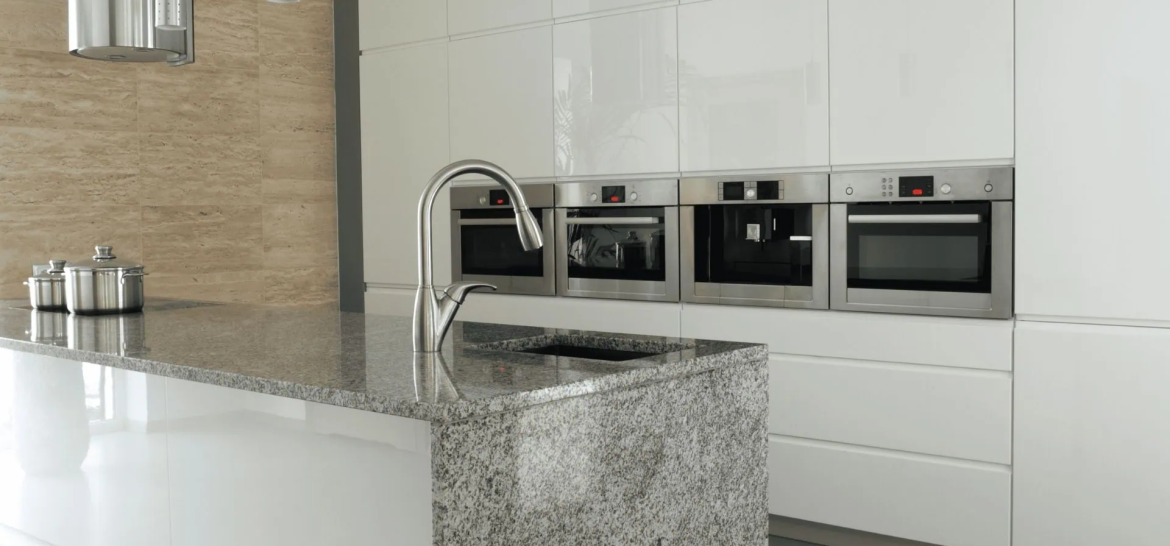Our blog post discusses the age-old question: quartz or granite worktops for your new kitchen? Choosing a countertop material can be difficult because it sets the tone for your area. Do not worry! We’ll help you weigh the advantages and cons of each option so you can choose one that suits your style and needs.
Overview of Quartz and Granite Countertops
Quartz and granite are common kitchen countertop materials.
Start with quartz. This manufactured stone is 90% crushed quartz with resins and colors. It has several colors and designs, making it easier to match your design style. Quartz countertops are scratch-, stain-, and heat-resistant. Non-porous, they require little care.
However, granite countertops are natural slabs from quarries worldwide. Each granite slab has a distinct color, veining, and pattern, providing natural beauty to your kitchen. Granite is durable and heat-resistant, but it needs frequent sealing to stay stain-resistant.

Both materials have merits, thus selecting between them comes down to personal preference: Do you like quartz’s consistency or granite’s uniqueness? Budget, maintenance, and style should influence your choice.
After an overview, let’s explore each countertop material’s benefits and cons!
Pros and Cons of Quartz Countertops
It’s clear why quartz countertops are becoming more popular. Durability is a major benefit of quartz. Quartz countertops are sturdy and scratch-resistant, unlike genuine stone surfaces.
Another benefit of quartz countertops is their easy maintenance. Non-porous, they don’t absorb liquids and discolor less than granite. For busy kitchens with spills and stains, they are ideal.
Quartz countertops have many design options and are durable and low-maintenance. Since they are made rather than quarried like granite or marble, they come in many hues and designs to match any kitchen style.
There are drawbacks to choosing quartz for your kitchen countertop. The cost is the first issue. Quartz countertops cost more than laminate or tile. It is heat-resistant up to a point, but high heat can damage and discolor it.
When choosing quartz worktops for a kitchen renovation, many homeowners believe the benefits outweigh the negatives.
Pros and Cons of Granite Countertops
Many homeowners choose granite for kitchen countertops. Its classic and beautiful style can complement your kitchen. Granite, like any material, has pros and cons that you should weigh before choosing.
Durability is a major benefit of granite countertops. Granite is extremely durable and can endure tremendous heat, making it ideal for placing hot pots and pans directly on it. Sealed granite resists scratches and stains.
Another benefit of granite countertops is their natural beauty. Granite slabs have unique patterns and colors due to natural development. This gives your kitchen a unique look because no two pieces are alike.
Granite kitchen countertops have drawbacks. A major drawback is expense. Granite countertops cost more than quartz or laminate. As a natural stone, installation can be complicated and time-consuming.
Maintenance is another problem of granite countertops. They may be cleaned with mild detergent and water, but they need frequent sealing to prevent stains and bacterial growth.
Which Countertop Is Best for Your Kitchen?
Choosing the right kitchen countertop involves several criteria. Quartz and granite countertops have distinct benefits that make them popular with homeowners.
Discuss quartz countertops. Durability is a quartz benefit. It resists heat, scratches, and stains well. This makes it great for busy kitchens with spills and accidents. Quartz countertops do not need sealing like granite, therefore they require less upkeep.
Granite countertops, however, have a natural beauty that cannot be reproduced. Each granite block has a unique color and design, giving your kitchen a unique appeal. Granite is heat-resistant, so you may safely place hot pots and pans on it.

Quartz or granite depends on lifestyle and choice. Quartz may be better for longevity and little maintenance. If you like the natural beauty and originality of stone surfaces in your kitchen, granite may be best.
How to Choose the Right Countertop for Your Kitchen
Finding the proper kitchen countertop might be difficult, but with some careful study, you can find it. Consider your lifestyle and kitchen usage first. Do you spend hours chopping and prepping? Prefer quick and easy meals? This will help you choose quartz or granite.
Consider your budget next. Quartz countertops cost more than granite, therefore granite may be better if cost is a consideration. Quartz lasts longer and requires less upkeep.
Another consideration is aesthetics. Quartz and granite come in many hues and designs, so consider your kitchen’s style before choosing.
Consider long-term worth. Both materials are durable, but quartz’s non-porous structure keeps its value better.
By considering lifestyle, money, aesthetics, and long-term value, you can safely choose quartz or granite countertops that meet your needs and tastes without sacrificing quality or design.
Conclusion
Quartz or granite worktops for your new kitchen rely on your choices and demands. Both materials offer distinct benefits.
Quartz countertops are durable, low-maintenance, and come in many colors. This non-porous material resists stains and bacterial development, making it ideal for busy kitchens with spills. Quartz slabs have regular patterns and colors due to its manufactured composition.
If you prefer natural beauty with intricate patterns and variances, granite countertops may be better. Granite is heat-resistant and durable, making it perfect for cooks and bakers. Due to millions of years of natural formation, each granite block is unique.
Consider money, design aesthetics (minimalist vs. rustic), upkeep (sealing), and durability (scratch resistance) when choosing a kitchen renovation project. Choose a countertop material that fits your lifestyle and enhances your kitchen.
Both stylish quartz and intriguing granite countertops will add value to your property and create an appealing place that reflects your particular taste. Before making this vital decision, examine the advantages and cons—after all, the heart of any home is in the details!
